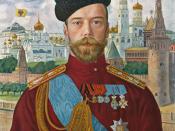Tsarism was a arch-conservative government that had problems in fitting itself into the modern world and coping with its changes. Russia was catching up with the European progress and its economy and society was still very primitive. For Tsar Nicholas to change that it would take time and require knowledge a strong leader has, however the Tsar certainly was not a brilliant leader, what would make things difficult for Monarchy to survive but chances could and should not be ignored.
As advised by his chief advisor Pobiedonotstev (who also became his son Nicholas' tutor) , Tsar Alexander III (1881 - 94) controlled the use of Russian language specially in schools, kept an eye on the educational system, forced conversions to Ortodoxy and dismissed disloyal judges.
Tsarism is a monarchy. In monarchies there are no elections, so the heir to the throne is always the older son, regardless of his interest or ability to reign.
Tsar Nicholas was not particularly a strong leader and was easily influenced by Rasputin. He was willing to make the least reforms possible and "preserve the principle of autocracy". Did not give the Duma much power. Did not increase freedoms (of speech, religion, movement and language). From Alexander III to Nicholas II, Russia did not have many social reforms.
The political, economical and social structure of Russia was clearly behind most European countries. The Russian government imposed industrialisation so to catch up with its Neighbours, an artificial manner seeing that it should have happened naturally. The number of urban workers increased rapidly, causing a crisis in accommodations, working conditions, demands and transport system. The urban crisis spread to the starving peasantry. This economic boom at the same time increased contact with Western ideas of government and society.
In contrast to the political oppression and resistance to...



Good effort
Very good analysis using a variety of sources and perspectives. A good general overview of a rather challenging topic given its period, and one that i would consider using as a model to my history students.
0 out of 0 people found this comment useful.